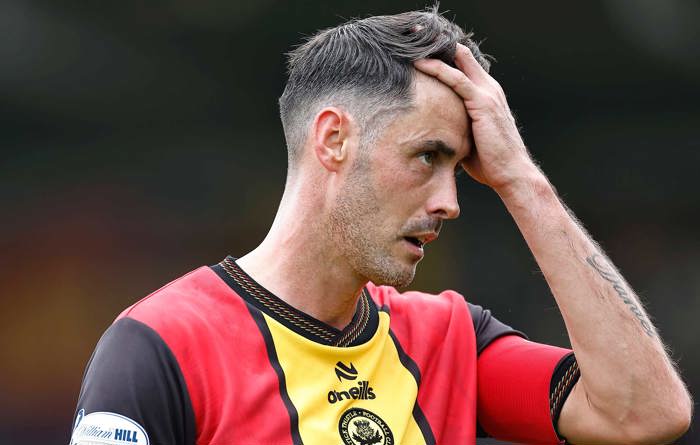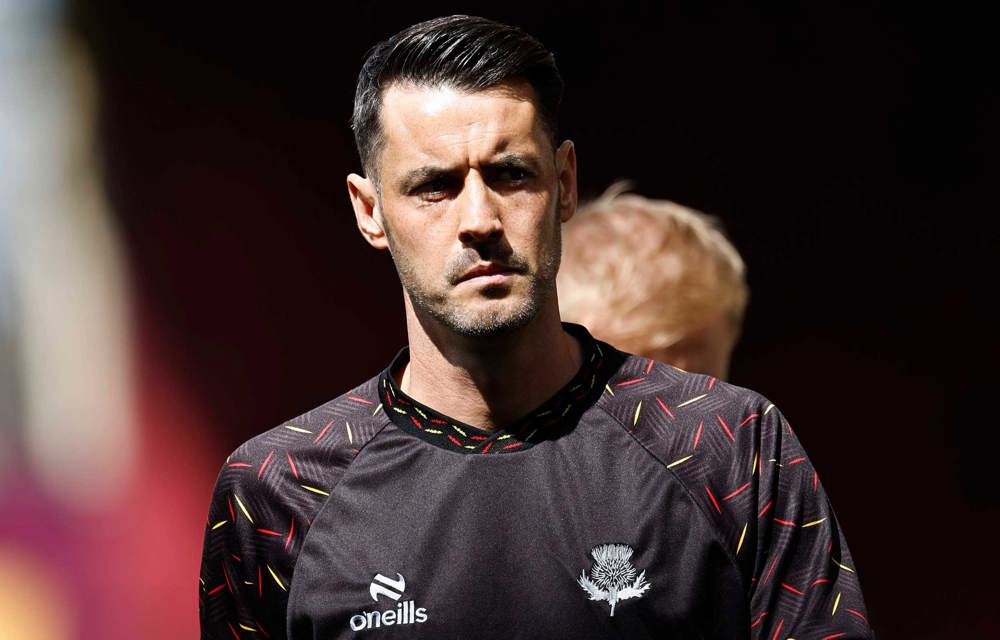Brian Graham has been the head coach of Partick Thistle Women’s FC since 2020, while maintaining his role as captain for the men’s side. The 36-year-old striker, who received the 2023/24 PFA Scottish Championship Player of the Year Award, is calling for better mental health support in professional football. This feature was posted on FIFPRO.org
By Brian Graham
Not everybody goes through life plain sailing. There are always going to be dips and curves around the corner, especially in football. You can have the high of a promotion and the low of an injury all in one week, and that’s on top of life’s everyday struggles.
Life can be a very cruel place, that’s the harsh reality of it. Sometimes we can take what we’ve been dealt with in our stride, but other times we need support to keep our head above water – and there should be no shame in asking for that.
Unfortunately, I’ve witnessed how critical struggles with mental health can be. I’ve felt the damage that can be done to families and friends. What I’ve taken from those experiences is that I will always try to be that person that someone can talk to and offer a safe space where they can open up.
When I started as a manager in the women’s game, I had a call from a parent. I answered worrying that I had maybe said or done something wrong, but actually it was a player’s mother phoning to tell me that her daughter had tried to take her life the night before.
I was completely thrown but did my best to offer my support in any way possible. We put the player in touch with a charity that I knew and organised counselling and, thankfully, she is still alive today.
People don’t see that side of football, but it’s there – in both the men’s and women’s games. People are more open talking about mental health than they were when I was starting out as a player, but the stigma is still present.

Support is offered, players are given cards with a special number to phone if they are struggling mentally, but I also know that there are players who don’t even take them home. And if I had a breakdown, would I call that number?
The inability to feel that you can talk about what you’re going through is one of the biggest issues with mental health. When it comes to football, we need to raise more awareness about the trusted network behind the scenes that players can be confident will support them. The union, PFA Scotland, has to play its part. They have a confidential service, but they also have a vital role in making sure players can feel safe about using their service.
If I get injured, I’m going for a scan – no questions asked. Pulled hamstring? Straight to the physio. We’ve got all of these specialists to ensure we reach our peak performance on the pitch, to help us win matches and bring home medals. But if someone has a voice in their head telling them that they’re not good enough? There’s not the same support. And that can be just as damaging to their game.
In a football environment, you need to be mentally strong. It’s a team game, but at the same time, when you’re coming through as a kid, you need to have the mentality of looking at those older players and thinking, ‘I want to take that jersey off you’. You’ve got to be driven, focused, and determined, and that demands a lot from you mentally, especially if you don’t get the results.
There are so many factors in a footballing career that can be responsible for a deterioration of mental health – from not making the first team to the ladder that has to be climbed after a serious injury.
It cannot be overstated how difficult that particular scenario can be: you show up for training every day, you’re stuck in the gym – often on your own – just working to get your body back to where it was, and then you show up the next day to start the whole process again, sometimes for nine months in a row. It can be extremely isolating and it’s not surprising that, for some, this can be a trigger for voices in their head, pulling them down.
“When it comes to football, we need to raise more awareness about the trusted network behind the scenes that players can be confident will support them”

I don’t have the answer on how we fix it. But I do think that having a person stationed at every club, someone that players know that they can turn to, would be a huge step forward. This is easier said than done for smaller clubs, where finances will play a big part in staffing decisions, but at the same time we can’t afford not to address the impact of mental health in football.
It doesn’t have to be a fully qualified doctor; I did a mental health awareness course through the PFA a couple of years ago, an initiative that was run through the Chris Mitchell Foundation, and I’ve applied what I learned to my role as both a manager and a captain. I’m not saying it’s a perfect solution, but I’ve picked up tips on how to address particular situations, and I think there are tools that would be helpful to everyone.
I like to think that I’ve got pretty good at reading people’s body language, especially as a manager. You can see when a player is high in confidence, and you can see when they’re a little bit lower. I use that as a cue for when I should reach out and ask: “how are you?”.
Just take the step. It’s as simple as that. Sometimes you’ll get a one-word answer, and you’ll have to go back and check in again, just to make sure. Sometimes they might just be having a bad morning, and that’s fine, but I’ll be having a look at their body language when they come in the next day – because the next time I ask – it might make a difference.
If everyone in a changing room knows that the manager – or anyone else in the building – has taken the time to do a mental health course, it not only singles them out as someone that might have the tools to help you, but it shows they are willing to invest time in the topic.
It’s then a priority, and just maybe more players will feel comfortable talking to them, rather than picking up the phone to a stranger. They might not always be able to give you the precise support they need, but hopefully they can help put you in touch with someone that can.
As a manager and captain, I see it as my role to be a rock for everyone else in the changing room, and I will always pick up the phone for someone that needs to talk. Sometimes, with two jobs, a family, and outside commitments, it’s a lot, and sometimes I’m tired, and find myself thinking, please, don’t anyone ring me today, but if they did, I would always be there for them.
It’s just that important for players, and anyone, to have someone that they trust to talk to on the other side of the phone, before it’s too late.



